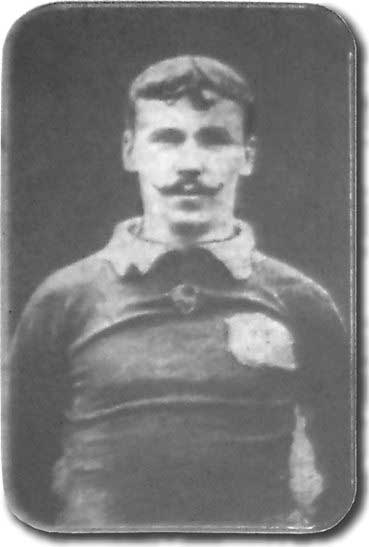 Part 1 - Results and
table
Part 1 - Results and
table
After a hugely promising beginning to their 1907/08 campaign, when they
had fleetingly topped the Second Division, Leeds City's form had collapsed
during a very depressing autumn and the team lay in the lower reaches
of the table as they entered 1908, with only their pride left to play
for.
New Year's Day saw City visit Glossop North End, a team four points and
three places below them, but boasting an unbeaten home record. The match
brought some much-needed relief, ending with Leeds' first win in five
games and their first away victory since 14 September.
The Peacocks played extremely well, as noted by Wanderer in the Leeds
Mercury: 'The superiority of the Leeds men was apparent almost from
the commencement of the game. They adapted themselves admirably to the
hard, slippery nature of the ground, and their long, swinging passes were
too much for the Derbyshire men. Their combination was excellent, and
it was very rarely one saw the ball misplaced … The Leeds City forwards
were very clever, especially the outside men. Croot and Parnell never
missed an opportunity, and the result was that they overran the Glossop
backs completely.'
Fred Croot, who had been in outstanding form for City all season after
arriving from Sheffield United in the summer, scored one goal and made
the other for centre-forward Billy McLeod in a 2-0 win.
About ten minutes from time, Glossop centre-forward Elmore had to be
carried off after a clash with full-back David Murray. Wanderer: 'The
affair was a pure accident - as the players themselves were ready to admit
after the match - but a section of the crowd took up a disgusting attitude,
and Murray came in for a storm of hoots and jeers. When he was leaving
the field some snow was thrown at him, but this was the work of one or
two irresponsible boys, who quickly dispersed at the sight of a policeman.'
As Flaneur later remarked in the Mercury, 'There is no doubt that
the team has improved in a marked degree since the Selection Committee
have discontinued the policy of change, and are relying match after match
… upon one set of players.'
The same eleven went out for a third successive game, on January 4 at
home to Leicester Fosse, and though they had to settle for a goalless
draw, Flaneur was distinctly impressed by what he witnessed: 'Possibly,
as one who only sees the City play at intervals, the improvement strikes
me more forcibly than it will strike the regular follower of the club.
It may be that in their match with Leicester Fosse at Elland Road on Saturday
the team did not show to such advantage as against Glossop in the little
Derbyshire town off the map on New Year's Day, but, comparing them with
the side I saw out against Barnsley in November, I have no hesitation
in saying that they are a distinctly better class lot now than then.
'There are, of course, still weaknesses, but what team is anything approaching
perfect? I have a tremendous admiration for Tom Hynds, whose work is always
brainy, and who places his passes with the artistry of a master, but Hynds
is a trifle slow. Then McLeod could be more effective if he would infuse
a little more dash into his play. He is too frequently robbed of the ball
through finessing and juggling for the short pass, when a dash straight
ahead or a long swinging pass might be much more effective. Gemmell, the
new man from Stoke, might, I think, make more use of his fine physique,
and should feed Parnell more effectively.
back to top
'So far as I can see, however, there seems to be a better understanding
between the players all round and the present team is worthy of a higher
place in the League table. It is true the City could not beat Leicester
Fosse. Indeed, that the visitors had probably slightly the better of the
play, but the Fosse are a decidedly clever team, and it was by no means
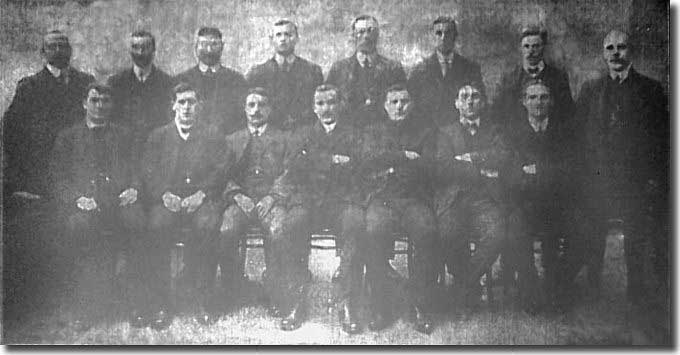 a
bad performance on the part of the home side to keep their home record
clean and share the points.'
a
bad performance on the part of the home side to keep their home record
clean and share the points.'
The upturn in form, leaving Leeds unbeaten in three matches, gave some
cause for optimism as the start of the annual FA Cup campaign beckoned.
Immensely heartened by a change of fortune, City returned to their temporary
headquarters at the Haddon Grove Hydro near Buxton, where they had been
enjoying special training for the previous week, to ready themselves for
a visit to Oldham Athletic.
Oldham were enjoying a strong season after being admitted
to the League in the summer, and were sitting level on points with Derby
County, Bradford City and Hull City at the top of the Second Division
table. They represented a stern test for City's Cup ambitions.
If truth be known, the Peacocks were never in the contest, despite only
losing 2-1 to a team that were unbeaten on their own turf. It was a poor
game, but City were well beaten. Athletic opened the scoring after fifteen
minutes and were two ahead by the break, choosing to settle for that advantage
as they faced a stiff breeze in the second half. Leeds outside-right Fred
Parnell flicked the ball over the keeper to reduce the arrears, but the
goal failed to spark any sort of comeback and City's Cup challenge faded
meekly.
The match was the first in a run of five straight reverses that left
Leeds City in disarray.
A crushing 4-1 defeat at Hull City on 8 February left the team tottering
uncertainly on the verge of slumping into the re-election zone. The clubs
around them had games in hand, and Leeds seemed to have forgotten how
to win. They had registered just one victory in nine games, and only two
wins in fifteen. More worrying still, the forwards were going through
the most unproductive of patches - Billy McLeod's late goal at Anlaby
Road was City's first successful effort in five games. The defence, with
goalkeeper Tom Naisby in fine form, was proving exceptionally difficult
to break down, but the Leeds front line was profligate in the extreme.
| |
Bottom of Division Two - 8 February 1908 |
| |
Pos
|
|
P
|
W
|
D
|
L
|
F
|
A
|
Pts
|
| |
11th
|
Stockport
County |
26
|
8
|
7
|
11
|
34
|
40
|
23
|
| |
12th
|
Gainsboro'
Trinity |
25
|
9
|
5
|
11
|
32
|
48
|
23
|
| |
13th
|
Barnsley |
24
|
9
|
4
|
11
|
41
|
37
|
22
|
| |
14th
|
Leeds
City |
25
|
8
|
5
|
12
|
36
|
48
|
21
|
| |
15th
|
Clapton
Orient |
24
|
8
|
5
|
11
|
29
|
44
|
21
|
| |
16th
|
Glossop
North End |
23
|
6
|
4
|
13
|
33
|
52
|
16
|
| |
17th
|
Blackpool |
25
|
4
|
7
|
14
|
35
|
45
|
15
|
| |
18th
|
Grimsby
Town |
25
|
5
|
5
|
15
|
26
|
54
|
15
|
| |
19th
|
Chesterfield |
24
|
3
|
8
|
13
|
26
|
64
|
14
|
| |
20th
|
Lincoln City |
25
|
5
|
1
|
19
|
33
|
66
|
11
|
| |
|
|
|
|
|
|
|
|
|
For all the gloom, however, the defeat at home to Bradford City on 1
February had seen 35,000 people pack into Elland Road to set a new attendance
record with receipts of £682. The figures, though, were artificially boosted
by the attraction of a local derby against a team pursuing promotion,
who brought many of their own supporters with them across the West Riding
- the home games either side of the Bradford contest drew attendances
of just 10,000 and 8,000.
City could scarcely look forward to a 15 February tussle with Derby County
at Elland Road with any enthusiasm - the East Midlands side was leading
the table, without a reverse since 21 December.
Yet it was now, just when the odds seemed stacked against the Yorkshiremen,
that Gilbert Gillies' ailing team finally got their act together and put
on a breathtaking display, turning in as powerful and effective a performance
as they had managed all season.
Their morale was boosted by the award of a penalty after ten minutes
for a foul on McLeod as he raced through. Murray dispatched the kick with
some assurance, blasting it in off the underside of the bar. Bevan equalised
for the Rams after 22 minutes, but Croot soon restored City's lead with
a tremendous goal.
There were no further scores before the interval, but Leeds routed their
opponents effortlessly after the break, cruelly exposing the shortcomings
of County's stand-in goalkeeper Ernie Scattergood, 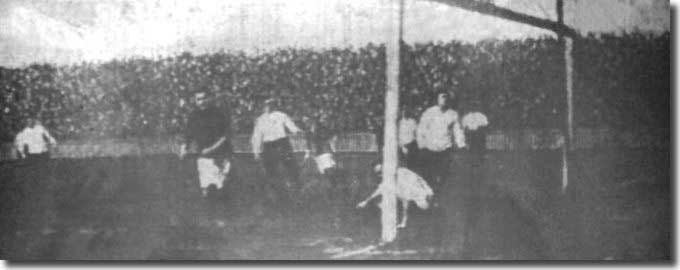 deputising
for England international Harry Maskrey.
deputising
for England international Harry Maskrey.
Croot and Lavery combined smartly on the hour mark for the latter to
give City a two-goal advantage with a decent shot. McLeod added a further
two goals in the last fifteen minutes to complete a 5-1 demolition, which
had the Mercury's Flaneur drooling. 'It can no longer be said that
the City forwards cannot shoot, or that McLeod lacks the essentials of
a centre. Whether recent criticisms have had their effect on the ex-Lincoln
City man I do not know, but I do know that on this occasion he played
like an artiste. Instead of hanging about on the off chance of getting
an opportunity to shoot, he really led his forwards, and the manner in
which he kept the whole line moving was very effective. One hardly knew
which to admire more, his increase of energy or his deft touches to the
wings. It was McLeod transformed, and the centre-forward will no longer
be fearful of losing his place to Jefferson or anyone else.
'Whether McLeod's remarkable improvement made all the difference it would
be difficult to say, but there is no doubt the forwards played their game
of the season. Parnell and Watson, on the right wing, were not so effective
as I have sometimes seen them, but the other three were brilliant, Lavery
giving a delightful display at inside-left, and feeding Croot as I have
not previously seen the old Sheffielder fed. Lavery has his off days,
like other players, but he has always been keen and a thorough trier,
and one is glad the directors, who do not appear to have been very clever
in their search for an inside-forward, have fallen back on a really capable
man. It is true Lavery made one or two bad shots in the first half, but
he also made some very good ones, and his combination with McLeod and
Croot was the feature of the match.
'In Croot, Leeds City possess a very brilliant outside-left, who only
needs adequate support to prove one of the most dangerous men in the position
in Second League football. His goal in the first half was a very fine
effort, though the credit was shared by Hynds and McLeod, the former of
whom opened out the play, while McLeod took advantage of a weakness on
the part of the Derby backs to slip in between them and then pass prettily
to Croot, who scored with a fine oblique shot.'
City's play had been astonishingly good. However, what came next was
a more unpleasant surprise - five days later, the news broke that secretary-manager
Gilbert Gillies had quit the club.
Flaneur hinted at unrest that had been brewing for some little time:
'Our announcement yesterday that Mr G Gillies had resigned his position
as secretary and manager of the Leeds City club will no doubt have caused
considerable surprise to the general public, though some of us have been
quite prepared for the step for a few weeks past. It was hinted to me
some little time ago by a gentleman who has considerable knowledge of
the inner workings of the club that Mr Gillies would probably retire from
his position at the end of the season, and the name of a probable successor
was mentioned. Mr Gillies has not been altogether comfortable this season,
and he has at length felt that he has no alternative but to resign his
position.'
back to top
Gillies had successfully steered Leeds City's entrance into the Football
League, as he had done earlier with Chesterfield, and overseen a
decent first season for the club, but appeared to have lost his way
since then. It was darkly hinted that the recruitment of players had been
left to other, less experienced, staff, with Gillies engaged chiefly in
managing the significant improvements to the Elland Road stadium and pitch.
Gillies was nearing the end of a three-year contract, but had become
dispirited by poor results, criticisms by supporters and lack of support
from the board. In many ways, he felt he was being made the scapegoat
for inaction by the directors, a view which was echoed by some of the
club's supporters.
A Thorough Peacock had written thus to the Leeds Mercury: I have
been a member of the Leeds City FC ever since it started, and now I am
about disgusted with the club I support. I noticed that the gate on Saturday
(against Bradford City) realised £682. I think the committee would be
economising if they put another £318 to that and 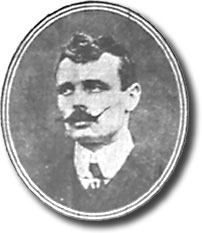 brought
three good inside men. I say let them speculate and get a good team like
Bradford City, and what they spend will soon come back again.
brought
three good inside men. I say let them speculate and get a good team like
Bradford City, and what they spend will soon come back again.
'If they only look round, they will see the gates are gradually falling
off week after week. I should like to ask if there is any way or means
of doing like our friends at Headingley - that is getting an open meeting
of all members. I am an old Association player, and I should like to see
a team in Leeds that would hold a good position in the First Division.
I know very well "Rome wasn't built in a day," but the directors
have had time to put a better team in the field. Good men are to be got
if they will only speculate.'
Gillies' pride had been badly dented and he chose to throw in the towel,
leaving the club to seek out a successor. He re-emerged within a few months
to lead Bradford Park Avenue's successful campaign for Football League
status.
The manager's passing was marked in spectacular style a couple of days
later when City suffered a dreadful experience in their game at Lincoln
City. The stadium was rocked 'by one of the most violent storms ever experienced
on a football field, a storm which wrecked the members' stand and caused
serious personal injury to several of its occupants. A gale of wind was
sweeping the ground when the players began the match, and there were streaks
of lightning and thunder rumblings in the near distance. In a few minutes
the storm burst over the ground with great fury. Large hailstones pelted
down, and the lightning, thunder and cyclonic wind made the game one not
to be readily forgotten.'
The roof was ripped off the stand, injuring five spectators, with play
impossible for some forty minutes. The match should have been abandoned,
but referee Mr Horrocks decided to play on in atrocious conditions, with
players struggling to keep their feet in the teeth of a horrific gale,
and the half time break dispensed with to get things over more quickly.
The City players were a dispirited and dejected lot, seemingly unable
to raise any resistance and slumped to a miserable 5-0 defeat. It was
symbolic of their entire season, as a directionless ship drifted grimly
into troubled waters.
It took well over a month of searching and negotiation for a sub-committee
of the board to come up with a successor to Gilbert Gillies. On Wednesday,
25 March, it was announced that Brighton and Hove Albion manager Frank
Scott-Walford had accepted the role of general manager. There were
around 90 applicants for the post, but the selection of 36-year-old Scott-Walford
was unanimous. However, a fortnight passed before the appointment could
be confirmed, while City, the new man and his old club negotiated arrangements.
He still had two years left on a five-year contract with the Sussex club,
who were reluctant to let him go. In the end, though, they agreed to allow
him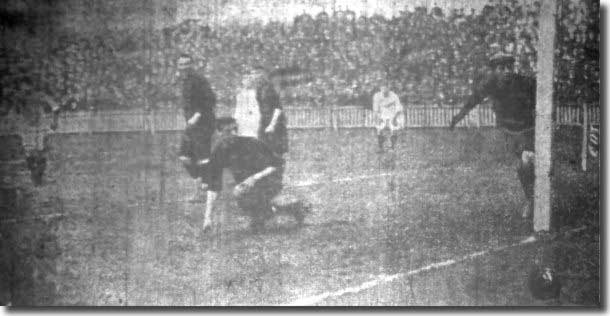 to commence duties from the beginning of April 1908.
to commence duties from the beginning of April 1908.
After a number of years as a player with Tottenham, Lincoln, Small Heath
(later Birmingham) and Aston Villa, Scott-Walford had established Brighton
in the Southern League after taking over in 1905 and had clearly demonstrated
his aptitude in management. He was banned by the Football Association
for 4 months in 1906 for irregularities in approaching other clubs' players
as he sought to rebuild a depleted team, but he impressed the City board
as a man who could take their club on to the heights of which they had
always dreamed.
Scott-Walford's initial job, however, was to ensure that Leeds retained
their Second Division status, as Oldham's 2-1 victory at Elland Road on
March 28 left his new charges in desperate straits, sitting fifteenth
in the table, just six points clear of the re-election places.
The dismal form of Chesterfield and Lincoln City at the foot of the table
gave Leeds breathing space, but they could not rely forever on the misfortune
of others. They still required four points from their final four games
to make their position safe.
After a goalless draw away to Clapton Orient and a 2-0 defeat at lowly
Grimsby Town, Scott-Walford's reign was finally marked with a victory
on 17 April, City's first since 7 March. As they played host to Stockport
County, they had enjoyed just two victories in 24 matches and had only
managed 10 goals in 14 games, with half of them coming in the 5-1 slaughter
of Derby County.
It was a dismal game against poor opponents, and City struggled to impose
themselves, but goals from Gemmell, McLeod and Croot secured a 3-0 win
with goalkeeper Naisby enjoying an untroubled afternoon. The points were
more important than the performance, and safety was ensured a week later
when the team beat Cup finalists Wolves 3-1 at Elland Road. The Black
Country men rested seven of their first-team with little riding on the
result for them, but they still managed to take the lead. They allowed
City back into the game after the break, however, and the Peacocks emerged
easy winners, much to the relief of the directors.
The Yorkshire Post put the improvement down to the arrival of
the new manager, headlining with 'Leeds on the up-grade", and going on,
'There have been better exhibitions on the Elland Road ground, but it
is questionable whether spectators have ever enjoyed play to the same
extent. Croot's runs along the touchline and accurate centres appealed
forcibly to all. His flights held the spectators spellbound, a hush of
expectancy accompanying every movement.'
Flaneur's notes in the Leeds Mercury during his piece on the home
defeat to Oldham on 28 March captured the views of many in West Yorkshire
as the season drew to a conclusion: 'If the Leeds City team were as satisfactory
as the ground and arrangements at Elland Road, the directors of the club
would have no misgivings on the score of ways and means. There is a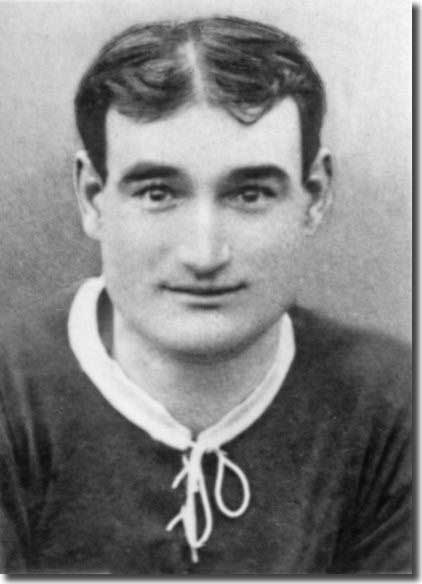 large and enthusiastic public for soccer in Leeds; there would be a larger
and more enthusiastic public if the City club were making a fight, like
the other young Second Division organisations, for a place at the top
of the table instead of languishing among the bottom half dozen.
large and enthusiastic public for soccer in Leeds; there would be a larger
and more enthusiastic public if the City club were making a fight, like
the other young Second Division organisations, for a place at the top
of the table instead of languishing among the bottom half dozen.
back to top
'Leeds City have accomplished one performance this year, their victory
over Derby County, that has given them a claim to be regarded as a team
of somewhat greater ability than the three or four clubs that are fighting
to escape the anxieties attendant upon an application for re-election,
yet they can still attract - or was it the opposition that attracted?
- as many as 15,000 people to Elland Road.
'It will be for the new secretary-manager, Mr Scott-Walford, to so remodel
the team that next season the City record shall be more worthy of the
support the club already receives. Mr Gillies showed, when he was appointed
to the position, that it was possible for an association manager of experience
to build up a good side. Perhaps if the purchase of players had throughout
been left entirely to him Leeds City would have had an equally good side
today.
'Mr Scott-Walford may be given more freedom in the matter of team building
than Mr Gillies was permitted, and, if so, Leeds City should rise out
of the ruck at the bottom of the table next season. It is too much to
suggest that the club will this year attain even the moderate position
held twelve months ago, when, though they were below their three Yorkshire
rivals, they occupied tenth place in the League table.
'Since January 1st Leeds City have captured six points by beating Derby
County and Barnsley and drawing with Leicester Fosse and Chesterfield.
They have been beaten by Stoke, West Bromwich Albion, Bradford City, Hull
City, Lincoln City, Fulham, Burnley and Oldham Athletic (twice). And four
of those defeats have been sustained at home. Indeed, they have only taken
four points from the seven matches played at Elland Road this year. This
is not a record of which either the team or the directors can be proud,
yet the club can still command a gate of fifteen thousand.'
With City's immediate future secured by a 12th placed finish, Scott-Walford's
thoughts turned to clearing the decks and starting afresh. He made his
intentions perfectly clear as early as the first week of May. Bob Watson,
Jack Lavery and Bob Jefferson all departed the club and the manager returned
to Brighton to sign four of his former men, with a further two Southern
League players also arriving at Elland Road. This was despite the club
having suffered a new record loss for the year of £728, increasing their
cumulative deficit to £944 - the directors gave the manager clear evidence
of their faith in him by bankrolling an expensive recruitment campaign.
This was to be a close season of enormous change as the new broom sought
to address the shortcomings that had been all too evident in a year to
forget, and prepare a team that could finally challenge for promotion.
Scott-Walford had decided to build his team around the axis of Tom Naisby,
Stan Cubberley and Fred Croot, who had been both the outstanding performer
and the only ever-present - Billy McLeod had finished top scorer with
17 goals, but it was the remarkable Croot who had taken all the honours:
'The star of the Leeds City front line was Croot. His brilliant runs down
the wing and capital centres or shots at goal were quite a feature of
the game, and he came in for quite an ovation.'
Part 1 - Results and
table












 a
bad performance on the part of the home side to keep their home record
clean and share the points.'
a
bad performance on the part of the home side to keep their home record
clean and share the points.' deputising
for England international Harry Maskrey.
deputising
for England international Harry Maskrey. brought
three good inside men. I say let them speculate and get a good team like
Bradford City, and what they spend will soon come back again.
brought
three good inside men. I say let them speculate and get a good team like
Bradford City, and what they spend will soon come back again. to commence duties from the beginning of April 1908.
to commence duties from the beginning of April 1908. large and enthusiastic public for soccer in Leeds; there would be a larger
and more enthusiastic public if the City club were making a fight, like
the other young Second Division organisations, for a place at the top
of the table instead of languishing among the bottom half dozen.
large and enthusiastic public for soccer in Leeds; there would be a larger
and more enthusiastic public if the City club were making a fight, like
the other young Second Division organisations, for a place at the top
of the table instead of languishing among the bottom half dozen.